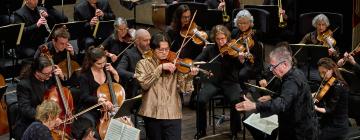You don't have to be a critical genius to figure out that Talise Trevigne, the star of San Francisco Lyric Opera's new production of Lucia di Lammermoor has a major-league voice and star quality to match. She lit a fire under Saturday's satisfying, if basic, performance at the Florence Gould Theater at the Legion of Honor. But hers was far from the only positive contribution of the evening. This is a well-tuned show, amply repaying its bargain-basement ticket price.
Trevigne, in her first impersonation of Donizetti's formidable title role, proved that she has all the required vocal resources and musicianship. Penetrating, round tone at both registral poles is just the beginning. She threw out clear, unaspirated passagework; was always precisely on the beat, showing a great sense of rhythm; and phrased and softened attacks like the seasoned pro she is on her way to becoming.
As an actor, too, she proved equal to the task. She allowed no operatic or stagey mannerisms in her performance and from the outset conveyed Lucia's emotional fragility. Stage Director Heather Carolo gave her characterization a real boost: We first discovered Lucia, almost hypnotized, gazing into a well as the scene prelude was being played. It would have been nice to see equal sensitivity to the music in the oboe solos introducing her in the Act 2 confrontation with her brother, but that would have required taking some risks with pantomime gestures.
When Trevigne took over — as she must — for the mad scene, her performance reached an extraordinarily high level. It lacked only the vocal nuances that she'll add as she grows in the part.
As Edgardo, her dispossessed lover, Daniel Cardwell was miscast. The high tessitura doesn't sit well with him. His vocal production was strained, resulting in some pitch uncertainty that was especially unpleasant around the break. His sound had no real presence. He looked wooden and acted unconvincingly, partly because he was overtaxed by the role's vocal demands.
Michael Zwiebach is the senior editor/content manager for SFCV. He assigns all articles and content, manages the writing staff, and does editing. A member of SFCV from the beginning, Michael holds a Ph.D. in music history from the University of California, Berkeley.
